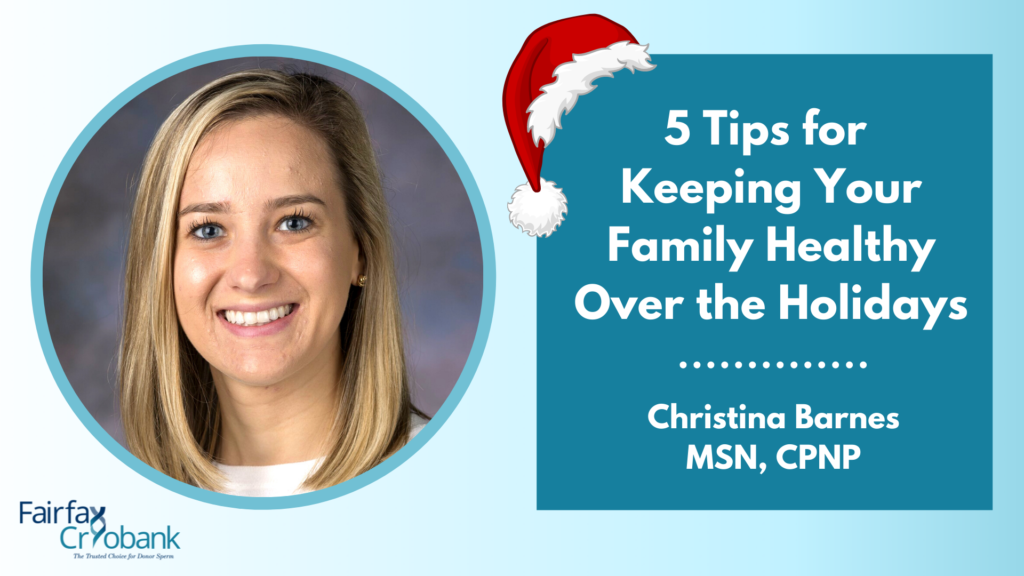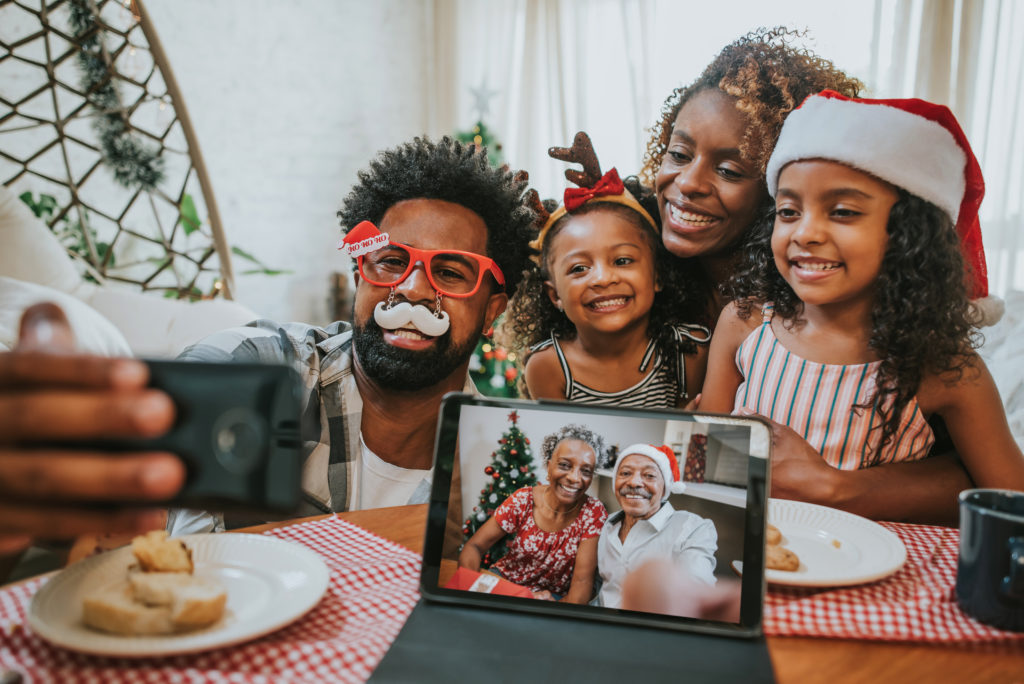5 Tips for Keeping Your Family Healthy Over the Holidays
Take a look at these 5 tips from Guest Blogger, Christina Barnes, MSN, CPNP on how to help keep your family healthy during the holiday season.

These last two years have been tough, especially for new parents. My son was born three weeks before the start of the pandemic in 2020, and over the course of his first year we celebrated holidays and milestones without grandparents, aunts, uncles, and cousins. But now that things are returning to normal with the rollout of the covid-19 vaccines, my husband and I can’t wait to reconnect with our extended families over the holidays.
If you have plans to travel or see family this holiday season, it’s possible to stay healthy and have a great time. You can help protect your family by following these simple tips:
1. Don’t be afraid to set boundaries
As parents, one of our most important jobs is to protect our children. Sometimes that means refusing to let your 2 year old play with the leaf blower (a constant battle at my house), and sometimes that means setting limits on interactions with others that feel unsafe. I am here to tell you that it is 100% acceptable for you to set certain rules and expectations with others. If you don’t want people to hold your newborn because you don’t want to risk him getting sick, say so. If anyone pushes back, stand firm and remind them that this isn’t about them, it’s about you doing what you feel is best for your child. Sharing these boundaries before you even arrive can give them time to set their expectations.
2. Vaccinate, vaccinate, vaccinate
Vaccines are extremely effective at preventing illness and saving lives. Take polio, which in the 1940s and 1950s was one of the most devastating diseases in the United States. More than 35,000 people in the US were disabled as a result of polio each year. Parents were scared to let their kids play outside, and public health officials imposed quarantines in areas with polio outbreaks (sound familiar?). Then, in the early 1950s, the polio vaccine was invented and given throughout the country. Thanks to widespread vaccination and the continued use of the polio vaccine, polio has been completely eliminated from the United states for more than 30 years. The eradication of polio is a fascinating example of how and why vaccines work.
So what does this mean for you and your family? Get vaccinated! Talk with your healthcare provider about getting any recommended vaccines for you and your children before traveling or spending time with others. Get the flu vaccine and, if eligible, make sure you’re up to date on the covid vaccine. Parents with young infants can even ask family members to get the TDaP (tetanus, diphtheria, and pertussis) vaccine before spending time with the baby. Pertussis, commonly known as whooping cough, is a very contagious respiratory disease that can cause severe difficulty breathing in infants. Pediatricians frequently recommend that anyone caring for an infant receive the TDaP vaccine, and it’s widely available at most places that provide flu shots.

3. Prioritize rest
Rest is so important for our physical and mental well-being, but it’s frequently neglected when planning for the holidays. Sleep and relaxation helps our bodies heal in many ways. When we sleep our blood pressure decreases, our immune system is more effective, and our body regulates our blood glucose levels. Getting enough sleep also helps with weight control; if you’re sleep-deprived, the hormones that control your appetite can become unbalanced, making you want to eat more. This can be especially difficult when you’re surrounded by the delicious, sweet, heavy foods of the holidays. I’m not telling you not to indulge – I’m just suggesting that getting enough sleep can help you to eat only what your body needs, which will leave you feeling better in the long run.
When it comes to rest, remember that your mental health is important, too. Give yourself time to decompress and recharge over the holidays. For some, that may look like carving out time to read a book or take a walk outside. For others, that may be scheduling time to spend with friends and family or getting dressed up for an elaborate party. Don’t be shy about prioritizing whatever makes you feel good.
4. Wash your hands
I know, you’re probably sick of hearing this, but it really does work! I won’t belabor the point, but please wash your hands with soap and water regularly throughout the day. I’d also suggest having small bottles of hand sanitizer for when you’re on the go – in your car, your purse, the diaper bag, your coat pocket etc.
If you want to know more about why hand hygiene actually works, check out the CDC’s Frequently Questions About Hand Hygiene
5. Know where and how to get medical care if you or your child becomes sick
When you combine traveling with eating too much food (and maybe drinking more alcohol than you’re used to), it’s normal for your body to feel off. Some people become constipated, bloated, or tired. Children and infants are notorious for having disastrous sleep schedules on vacation, waking up throughout the night and resisting bedtime. You may feel like something is seriously wrong when you’re awake with indigestion at 2 am or your toddler cries for the 47th time in one night, but the following tip can save you from an unnecessary ER visit while out of town.
If you have concerns and nobody is in immediate danger, the best course of action is to call your primary care provider or your child’s pediatrician. Primary care offices should have an on-call doctor that you can speak with any time, day or night, 365 days a year. You can call this number whether you’re home or away over the holidays. If you’re going out of town, make sure to get this number from your doctor’s office before you leave. Your doctor’s office will have all of you or your child’s medical records, so they’ll be able to answer any questions you have without having to start from scratch. The doctor can tell you what your next steps should be, and they may even be able to send in a prescription depending on what state you’re in. They can also advise you on where you should go if you or your child need medical care; for example, urgent care vs. emergency room.







